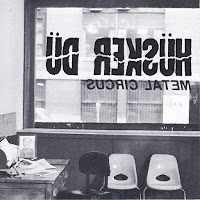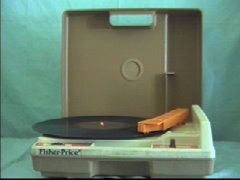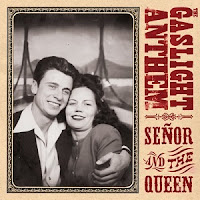Hüsker Dü -- Metal Circus
Metal Circus was the first Hüsker Dü record I ever heard. It was also the first record I ever owned by a band that would become a central player in the soundtrack of my youth (and, so far, young adulthood). I don't remember where I found it, but I do remember listening to the cassette over and over until it began to show signs of wear. Yes. I owned the cassette. Tapes were where it was at when I began listening to music in earnest; CDs, with all their shininess and "don't get fingerprints on 'em" warnings, were still a bit too expensive for me when I was a teen. They were for rich kids. And since LPs were falling out of favor (pity!) by the early nineties, I really hadn't any other option . . . though, admittedly, I wish I could have played Hüsker Dü on my Fischer-Price turntable. That would have been kind of cool, no?
As I caught up with the swing towards digital music, I found that I played certain beloved tapes less and less. While I was able to find CD or iTunes versions of certain seminal albums like Never Mind the Bollocks, the first four Ramones disks, the Jam's first couple of records, and London Calling, I wasn't ever able to find Metal Circus. Not surprisingly, I hardly listened to it over the ten-year span following my switch to exclusively CD-based music.
Now I'm not sure whether or not the fact that I felt I couldn't play the album (or, rather, EP) contributed to the feeling, but Metal Circus assumed an unrealistically brilliant aura in my memory. Of course, as New Day Rising, and Flip Your Wig spun in my Diskman, I often thought back to the overplayed cassette versions of Zen Arcade and Metal Circus I had not listened to for so long. Over time, both tapes became legendary, part of Erik's Punk Rock Canon.
Fast-forward another few years, when the iPod nation has made the conversion of old music formats a profitable industry. Now, thanks to the wonders of technology, I have been able to digitize my cassette collection (finally, Generic Flipper on my iPod!). It probably says a lot about the power of memory, but the first cassette I digitized was Metal Circus. And I haven't been disappointed. Jesus, what a band!
It might sound weird, but I rather like listening to the MP3s I dubbed off the old cassette because it transferred some of the aural flaws to the digital file. It kind of adds a sense of authenticity to the experience. Or something equally quixotic and pompous-sounding.
At any rate, the Hüskers waste no time gunning their engines, opening Metal Circus with the blazing "Real World," a scathing critique of early 80s punk rock posturing. The frenzied melody of "Real World" continues on "Deadly Skies," as both tracks foreground Grant Hart's frenetic pounding and Bob Mould's soul-piercing, proto-Cobain growl (not to mention the melodic buzzsawing of Mould's guitar). The third track, the slower (by Hüsker Dü standards) "It's Not Funny Anymore," as is typical with Hart-sung songs, retains the melody of the preceding tracks while eliminating Mould's famous vitriol in favor of Hart's equally famous Hippie-punk mellowness. Hart's vocals, while undeniably less gruff than his more famous bandmate's, are not quite as smooth-sounding as those he showcases on later albums such as Flip Your Wig. The added rawness of Hart's voice on the track helps make the album feel a bit less Janus-faced than some of the band's later, more explicitly Mould-versus-Hart efforts. "First of the Last Calls," like "Real World" and "Deadly Skies" is remarkably fast-paced, with Mould's and Norton's relentless strumming layered atop Hart's mile-a-minute drumming, but the song's brilliant final thirty seconds (owing perhaps to Hart's perfectly timed ahh-ahh-ahh-ahhs) somehow manages to inject the aforementioned mellow quality for which Hart is known into the most splenetic of Mould's screeds in such a way as to make the entire album come together in a matter of seconds. While both "Lifeline" and "Out on a Limb" seem consistent with the band's sound during their early hardcore period, it is really "Diane" that, along with "First of the Last Calls" really suggests the wholly original direction the band was to take over the course of their career. Slower, but certainly not mellow, "Diane" is the song that made it possible for Nirvana to release "Polly" a decade later, chronicling the rape of a young woman from the perspective of her assailant.
Highlights:
Track 1. "Real World." Yeah, take that, Maximumrocknroll!
Track 4. "First of the Last Calls." You can hear the entire course of Husker Du's career on this one song. Fucking indispensable.
Track 6. "Diane." One of those extremely rare songs that single-handedly broadened the narrow confines of hardcore punk during the 1980s. Hüsker Dü churned out several dozen of these extremely rare genre-busting tracks, but this remains one of the best.
Sobriquet Grade: 93 (A).





Comments